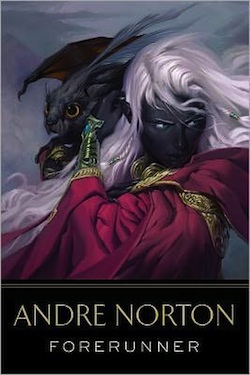The word Forerunner means a lot to you if you’ve read much Andre Norton. Even if you haven’t, you can probably extrapolate a lot of the implications: the ones who came before, who did great deeds and made great wonders… and about whom we know almost nothing. In the far-flung galaxy whose corners are the setting for much of Norton’s SF, the Forerunners are the species whose archaeological remains and artifacts, incomprehensible to the average person but capable of near-miracles, are sought after and fought over throughout the stars. Forerunner means power, dread, adventure, and the vast deepness of time.
It’s appropriate, then, that the book simply titled Forerunner was the first novel ever released by Tor Books: it came before a lot of other things, and has been out of print until this week and almost forgotten for most of the last twenty-five years. How does it hold up on re-read?
Very well, actually. It’s absolutely classical Norton and uses a lot of her favorite tropes, but those tropes were her favorites for a reason. It has an orphan protagonist, living in poverty, who is secretly special; a mix of tech levels, so that medieval and super-scientific living standards coexist; a set of nearly-telepathic companion animals who are bonded to the protagonist; and a trek over harsh country towards an unknown and perilous objective. (Honestly, ninety percent of Norton contains versions of at least three of these elements.)
What makes Forerunner special is that it animates its tropes with an underlying emotional arc that is done convincingly enough to sweep the other elements along with it. Simsa, the orphan, is from the Burrows, a shantytown built in the scraps of an interstellar port city. Her only friends are her vermin-catching zorsals, animals with whom she cannot communicate so much as coexist. When she gets tangled up in the affairs of a spaceman who wants to go into the wilderness in search of his lost brother, her life has taught her no social skills whatsoever. The reader can see that her spaceman is thoughtful, kind, honest, nowhere near as naive as she thinks him, genuinely friendly, and intrigued to have her as friend and partner. She can’t see any of that—she thinks he’s a babe in the woods, an overgrown child whose purpose is to make her life harder, and she expects betrayal at every possible point it could happen. She’d betray him, except that it never seems to be logistically convenient, and they’re running from scary people, and her zorsals like him…
The gradual way in which Simsa learns that not everyone is out to get her, the way she learns, if not at first to trust, then at least to interact with the first person she’s ever met who could become a real friend, is enough to make some of the book’s less plausible aspects feel more valid. Simsa’s coming to her own power through her realization of herself as a person who can have a friend parallels her coming to her own power as— as was inevitable, given the title— the last remnant of the Forerunners. Norton manages to make the realization that her protagonist is an almost-all-powerful alien being whose knowledge could shake the foundations of galactic civilization seem like a normal part of watching that protagonist grow up.
There’s still a lot of implausibility—how did Simsa end up in the city rubbish-heap anyway?—and Norton’s prose can err a bit on the side of overwrought analogies using made-up vocabulary words that are never quite explained. But the emotional beats are there (and don’t have the problem Norton sometimes has of scanting the finale), the action scenes are strong, the zorsals are cute and predatory, and Simsa has nifty claws. This is a strong book, dealing with the very centers of Norton’s mythologies and universes, and it’s lovely to see it coming back into print again.
Lila Garrott writes criticism, fiction, and poetry. She is a regular reviewer at Strange Horizons. She recently finished a project in which she read a book and reviewed a new book every day for a year, and the reviews can be found at her blog. She has blue hair and brown eyes.










